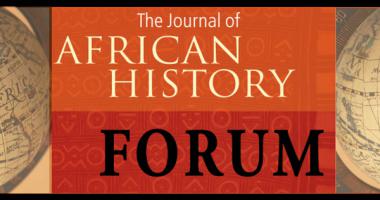JAH focus on Islam in Africa
Mauro Nobili
The latest issue of The Journal of African History (55/1, 2014: http://journals.cambridge.org/action/displayIssue?jid=AFH&tab=currentissue) presents a ‘forum’ on Islam in sub-Saharan Africa. The forum comprises three articles by leading scholars which approaches the issue from different perspectives: historical (one by Jean-Louis Triaud, Université de Provence and Institut des Mondes Africains - IMAF; the other by Scott S. Reese, Northern Arizona University) and anthropological (Benjamin S. Soares, African Studies Centre in Leiden).

Here follow the abstracts of the three articles:
Jean-Louis Triaud: “Giving a name to Islam South of the Sahara” (pp. 3-15)
This article revisits the concept of islam noir (black Islam) crafted in the context of French rule of sub-Saharan Muslims. For the French colonial administration, islam noir connoted the idea of a degraded Islam tainted by animist practices and therefore different from the pure Islam practiced in Arab countries. This differentiation was a way to separate it from ‘Arab Islam’, which was considered a subversive model. This distinction was not entirely new for it had already a long history behind it. Arabic sources had often shown a high distrust of sub-Saharan Africans who converted to Islam; they never really enjoyed a status equal to that of Arab Muslims. After the end of colonial rule, the story still continues. The theme of a specific sub-Saharan Islam (African Islam) remained a convenient category that was used by scholars, regardless of old prejudices. In the latest period, some African intellectuals have also embraced this concept, conjoining it with the pride of blackness, as a kind of Islam de la négritude, while praising its orthodoxy. It is this long epistemological and taxonomical adventure of islam noir that is examined here.
Scott S. Reese: “Islam in Africa/Africans and Islam” (pp. 17-26)
This essay discusses some of the recent trends in the scholarship on Islam and Africa that contribute to a more nuanced understanding of the historical relationship between African Muslims and the global ecumene of believers. Rather than looking at the faith as an insular African phenomenon, this piece examines the links between Africans and the wider community of believers across space and time. Such an approach has important ramifications for our understanding of the dynamics of Islam. However, it also challenges many of the assumptions underpinning the geographic area studies paradigm that has dominated the academy since the Second World War. This essay suggests the adoption of a more fluid approach to scholarly inquiry that re-imagines our largely continental attachment to regions in favour of a more intellectually agile methodology where the scope of inquiry is determined less by geographic boundaries and more by the questions we seek to answer.
Benjamin S. Soares: “The historiography of Islam in West Africa: An anthropologist’s view” (pp. 27-36)
In this article, I focus on the historiography of Islam in West Africa while also reflecting upon and assessing existing scholarship in the broader field of the study of Islam in Africa. My position as an anthropologist who conducts historical research informs my perspective in evaluating the current state of the field and my suggestions for directions in which I think future research might move in order to advance our understanding of Islam and Muslim societies and the history of religious life in Africa more generally.
The forum provides a state of the art introduction for students and scholars of Muslim societies in sub-Saharan Africa, but also represents a strong critique of a compartmentalised approach to the study of cross-religious phenomena such as Islam.